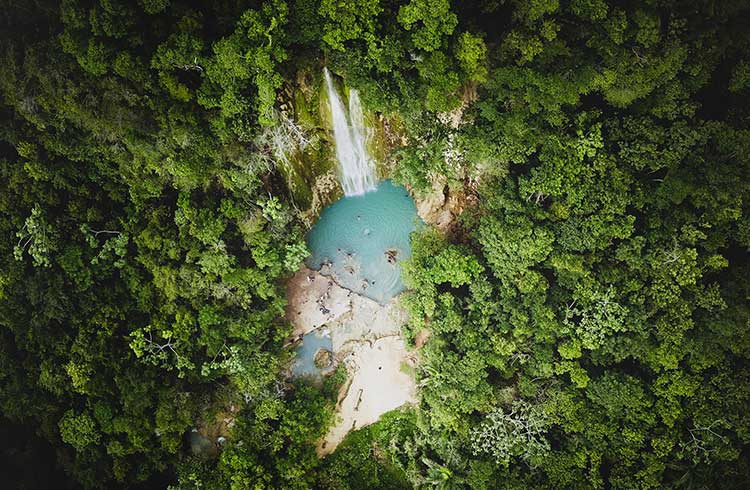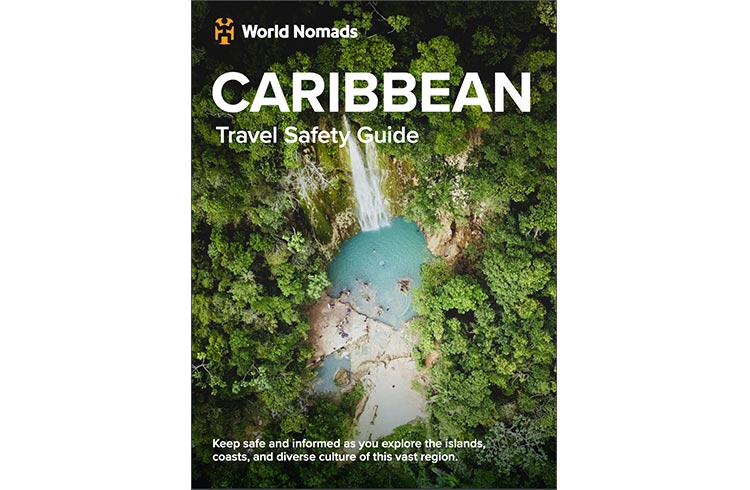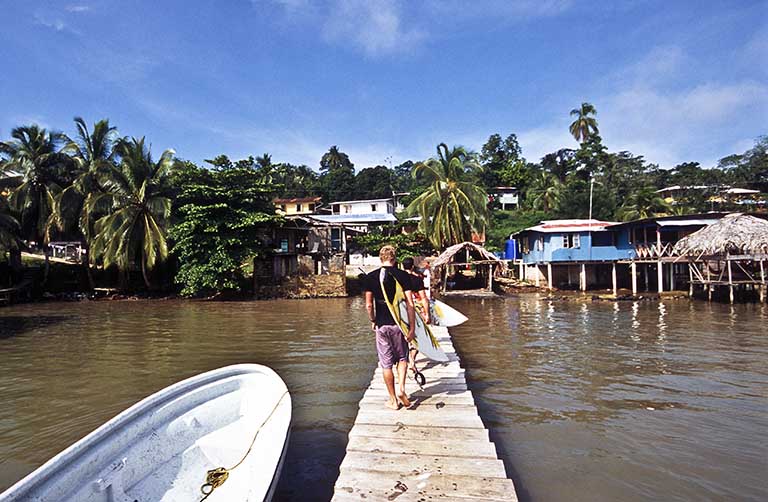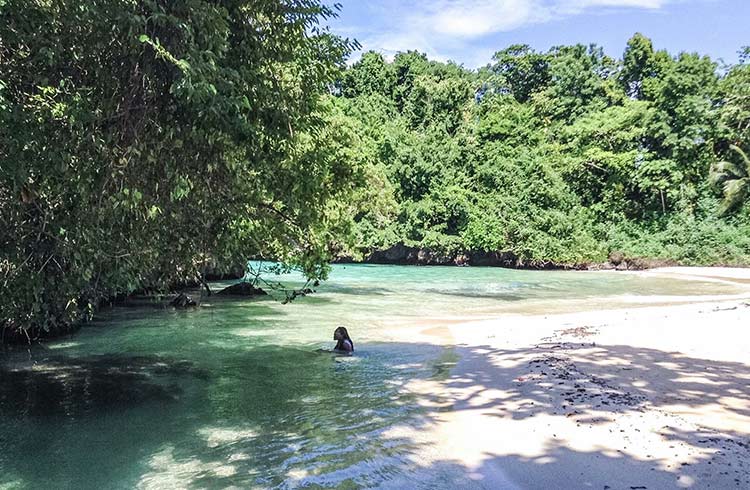How to Travel the Caribbean Safely: 7 Essential Safety Tips
It's idyllic and beautiful, but the Caribbean has a few risks for travelers, from crime and corruption to natural hazards. Joanna Tovia shares her commonsense tips to keep you safe and informed, so you can bravely explore the region.
 Photo © Getty Images/Fabien Burgue / EyeEm
Photo © Getty Images/Fabien Burgue / EyeEm
1. Passports, visas and money in the Caribbean
The Caribbean may seem relatively relaxed when it comes to visas and currency, but it’s still important to plan ahead.
Before you go
Travelers from many countries can visit the Caribbean without a visa, but agreements between countries vary. Trinidad and Tobago, for example, has agreements in place for visa-free travel for citizens of many countries around the world – but not all. While residents of the European Union, the US, the UK, and many other countries can travel without a visa, Australians and New Zealanders need to secure a visa on arrival, while travelers from other countries need to arrange one before they leave home.
Even if you’re only visiting an island for a day trip, it’s still a good idea to have a visa pre-arranged for all destinations that require them. Fingers crossed this doesn’t happen to you, but a serious health issue requiring urgent medical attention or an issue with your transportation may mean you need to spend more time in a place than you anticipated. Already having a visa can make life easier during an already stressful time.
If you’re traveling to the Caribbean via the USA, from a country that qualifies for an ESTA visa waiver (UK, Australia, and New Zealand among them), keep in mind that the time you spend in the Caribbean may count towards the 90 days you’re allowed to spend in the US. The Bahamas is one such example.
Passport protection
If you’re staying in accommodation on an island, avoid carrying your passport around with you. Lock it in the hotel safe if possible – leaving it on the beach while you take a dip creates an easy opportunity for thieves. It’s also wise to leave a copy of your passport at the hotel (ideally in the lining or locked, zippered section of your suitcase is wise), and email an additional copy to someone you trust before you leave home.
If you do have to carry your passport, conceal it under your clothes in a waterproof cover. Sweat, humidity, and water can damage the pages to the point your passport no longer passes muster.
Currency in the Caribbean
Visa, Amex, and MasterCard are accepted in tourist hotspots, and US dollars are accepted throughout the Caribbean, but if you venture beyond the major tourist areas, local currency is handy to have. Avoid keeping all your cash together, and whatever you do, don’t advertise that you have it by opening your wallet, purse, or money pouch in a crowd.
Travelers from beyond the US should change some money into US dollars before they leave home, as exchanging some currencies for local or US dollars won’t be possible once you’re in the Caribbean.
2. Personal safety tips for the Caribbean
Keeping money and valuables safe
You can withdraw local currency from ATMs, but take care to cover your PIN. There have been reports of foreign visitors being robbed after withdrawing money. A travel companion who can act as a lookout while you’re focused on the ATM is advisable.
If you’ve hired a car, avoid locking valuables such as cameras and mobile devices inside. Car break-ins are common and locals can often identify hire cars by their license plates, alerting them to a potential goldmine inside. Conceal anything you don’t want to be stolen in the glovebox or under a seat.
How safe is the Caribbean for LGBTQ+ travelers?
Even where same-sex relationships are legal, attitudes are still on the conservative side in some Caribbean countries.
Homosexual relations are illegal in these eastern Caribbean countries and territories (sometimes for males only): Antigua and Barbuda, Barbados, Dominica, Grenada, Guyana, Jamaica, Saint Lucia, Saint Kitts and Nevis, and Saint Vincent and the Grenadines. Holding hands or kissing a same-sex partner in public may attract negative attention. Criminal prosecutions of travelers are rare, but prison sentences range from five years to life. And the existence of gross indecency laws in these countries does nothing to curtail the stigma around homosexuality. As a result, few locals feel safe revealing their sexual orientation.
More welcoming are LGBTQ+-friendly islands such as Puerto Rico, St. Barts, St. Martin, and St. Croix.
While resorts throughout the Caribbean are typically accepting of all sexual orientations, if you’re traveling beyond such accommodation on the more conservative islands, it may pay to be discreet.
Hurricane season in the Caribbean
These are an unfortunate reality in the region, particularly between June and November.
Hurricane Dorian, which struck in September 2019, was the most intense tropical cyclone on record to strike the Bahamas and the worst natural disaster the country has endured. Grand Bahama and Abacos bore the brunt of the Category 5 hurricane, but many of the 700 islands in The Bahamas escaped unscathed, and tourism is already bouncing back.
Two years earlier, two Category 5 hurricanes swept through the eastern Caribbean, wreaking havoc on Barbuda, Dominica, Puerto Rico, and many other Caribbean islands.
Mudslides, flooding, high seas, and tsunamis can accompany severe tropical storms, which can change direction with little warning. Familiarize yourself with your accommodation’s evacuation plan, even when the skies are clear, and monitor media reports during your travels.
If a hurricane is approaching, find out early if and where evacuation shelters are being set up. Be aware that flights out may be suspended until winds subside enough for safe takeoffs. If airports and ferry ports sustain damage, your “getaway” may be longer than you anticipated.
Rising sea levels and higher temperatures resulting from climate change mean hurricanes in the Caribbean are becoming more intense. That doesn’t mean you should avoid the area, but traveling during peak hurricane season is not advised. The risk of hurricanes is lowest between December and April, with the added benefit of lower rainfall and less humid weather.
Some islands are more susceptible to hurricanes than others. Aruba, Barbados, Curaçao, and Grenada lie just south of the hurricane belt and rarely get hit head-on. Rarely doesn’t mean never, of course, so if you do get caught in a hurricane or severe storm, stay inside, away from windows and doors, to protect yourself from flying debris.
The Global Disaster and Coordination System (GDACS) is the travel companion you need in case of a hurricane or earthquake. The site provides satellite imagery, advisory information, and alerts.
Earthquakes in the Caribbean
The Caribbean is an active seismic zone but, although tremors are common, earthquakes rarely exceed magnitudes of 3.0. Knowing this should provide some peace of mind if the earth begins to shudder beneath you.
However, in 2010 a 7.0 earthquake struck Haiti, causing widespread devastation. And a recent earthquake (October 2019) measuring an unusual 5.0 on the Richter scale affected the British Virgin Islands, Dominica, Antigua and Barbuda, Anguilla, and several other islands. But the chances of your holiday destination being affected are slim, when you consider the number of harmless earthquakes occurring throughout the Caribbean on any given day. Take a look at Earthquake Track for a glimpse into the past 24 hours.
4. Transport safety in the Caribbean
Driving safety tips
The easygoing island vibe is one reason travelers love coming to the Caribbean, but this laidback attitude comes with a few dangers, especially on the roads. Even if there are speed limits, they may not be enforced, driving under the influence of alcohol or drugs is commonplace, and road rules such as signaling to turn or change lanes are often disregarded.
- If you’re venturing out of town, road conditions may not be what you’re used to (think potholes, sketchy road markings, and unsealed stretches) and can be subject to flooding during tropical downpours
- If you’re visiting more than one island, keep in mind that on some driving is on the left and on others driving is on the right – usually as a legacy of its colonial history. In Barbados and Jamaica, for example, you’ll be driving on the left, but on the right in Honduras and Puerto Rico
- Complicating matters is the fact that the steering wheel is usually on the left, regardless of which side of the road you’re required to drive on, simply because cars are typically imported from the US.
Public transport safety tips
- Getting around using public transport may seem wiser than driving, but this option also has risks worth knowing about. Buses may be poorly maintained, drivers may have varying levels of training, and buses are subject to the same hazards on the roads as cars and taxis
- Don’t be surprised if your bus or taxi driver navigates the roads with a cell phone in hand – new legislation is making this illegal on some islands, but laws may not be strictly enforced
- Reckless driving and a lack of sidewalks mean pedestrian accidents are common, so take care walking along roadsides and crossing the road, especially if you’re used to cars driving on the opposite side. Catch registered or clearly marked taxis if you can, rather than ridesharing in private vehicles or accepting a ride from someone you just met (your hotel should be able to book a taxi for you or advise on how to identify reputable taxis)
- Before you set off, be sure to agree on a price with the taxi driver, check accepted payment methods, and test that the seatbelts work. If you’re hiring a scooter or bicycle to get around, be sure to wear a helmet.
5. Adventure safety in the Caribbean
Parasailing, scuba diving, horse riding on the beach – if all goes well, vacationing in the Caribbean can be non-stop fun. Being smart about it can minimize the chance of accidents, keeping in mind that rescue services may not be as organized or efficient as you’d expect back home.
- The first step is to check whether the activities you have in mind are covered under your travel insurance policy, and what the conditions of that cover might be
- Next, check on the operator’s safety and communications equipment before booking, and find out if the company is registered. Boating and water sports operators are poorly regulated on many of the islands
- It’s tempting to throw caution to the wind when you’re in vacation mode, but using all available safety equipment, such as life jackets, just makes good sense. Use another operator if safety equipment isn’t provided, and ask for extra training on watercraft if you’re unsure how to safely operate it
- Novice horseback riders (or those who haven’t ridden for a while) should also take care – you may like the idea of galloping along the beach, hair blowing in the wind, but it’s far wiser to don a helmet and slow it down. Falling off a horse can quickly put an end to your vacation fun
- Your hotel or resort may help you book a tour or activity, but they don’t share liability with the operator if an accident occurs. The operators are independent and may not have liability insurance, so try to find a reputable one who does before signing up.
6. Law and crime on the Caribbean islands
The Caribbean may have a laid-back reputation, but it's not wise to let your guard down completely. Here's what you can do to help avoid trouble.
Corruption in the Caribbean
It’s no secret that corruption is rife on many Caribbean islands. Open a newspaper and you’re likely to read about a case of government or police corruption serious enough to make headlines. That’s not to say efforts aren’t being made to counter corruption, but deeply entrenched practices aren’t easy to stamp out.
Travelers are unlikely to be impacted, but rumors of police bribery are undoubtedly founded in fact, and can leave travelers in trouble feeling powerless.
In the Dominican Republic, for example, finding yourself involved in a no-fault car accident that results in serious injury or death will land you in custody for at least two days. Frustratingly, two days can stretch into weeks or months. The Dominican Republic has one of the worst rates of auto fatalities in the world, and about 80% of those being held in prisons, as a result, have yet to be sentenced.
Corruption can also impact travelers when drug dealers and police work together to trap them into paying bribes. Travelers who accept an offer to buy drugs may find themselves having to pay a substantial sum of money to the police officer, who appears out of nowhere to arrest them after making the transaction.
Avoid buying or using any illegal substances, and if you do get into strife, contact your embassy or consulate for assistance.
Crime in the Caribbean
Caribbean islands have varying crime levels, with murder rates some of the highest in the world. Most violent crimes are associated with gang warfare and drugs, but travelers are definite targets when it comes to theft, scams, and assault.
Drink spiking
By all means, kick back with a drink or two at a beach bar or nightclub, but keep an eye (or hand) on your drink at all times. If you need to use the restroom or want to hit the dance floor sans beverage, hand it to someone you know and trust, rather than leaving it on the bar.
Drink spiking with “date-rape” drugs such as GHB and Rohypnol is a known problem on many of the islands – Jamaica, Honduras, and the Bahamas among them. After losing consciousness, victims are robbed, assaulted, and then abandoned, leaving them vulnerable to further violations. Watch drinks being poured, refuse drinks from strangers, and mind your alcohol intake.
Harassment
Impoverished islanders who rely solely on holidaymakers to earn money can resort to aggressive tactics to make a sale. An assertive “no” is necessary to ward off pushy vendors.
Avoid eye contact and keep walking when vendors or taxi drivers call out to you as you’re walking past. If you’re pursued, be firm but polite in your refusal and keep walking.
Child beggars can pull at your heartstrings, but their requests for money can border on harassment, and giving them money may encourage them to continue begging instead of going to school.
Young women are likely to encounter catcalls and sexual advances from local men. Persuasive and even forceful pick-up strategies are used, particularly in and around bars at night, so try to avoid going solo, and dress fairly modestly.
Both men and women may be approached by prostitutes hustling for paid sex. Some travelers are attracted to the Caribbean because of its sex tourism industry, but all visitors are potential clients in the minds of local sex workers as a result. A firm “no” will be called for if this isn’t for you.
Those who do engage in sexual encounters should take precautions and be aware of the risks – the Caribbean is second only to Africa in the prevalence of HIV.
Theft
Cash, mobile devices, cameras, passports, and jewelry are all hot commodities in the Caribbean, with theft of luggage or belongings the most likely crime to affect travelers. Resorts often have their own security officers patrolling the entrance and grounds as a result, but remember to keep the doors and windows of your room locked and make use of the safe for any valuables – or better yet, leave them at home.
Theft from rental cars is a concern, and rental cars and boats themselves are susceptible to being stolen for joyriding or stripping for parts.
Motorcycle and moped riders are known to snatch handbags, cell phones, and backpacks slung over one shoulder from travelers as they zip past. Valuables left on the beach while you swim are also fair game.
Dressing like a local can minimize your chances of standing out as a potential target, no matter your skin color. Avoid wearing souvenir t-shirts that identify you as a foreigner, and pay attention to your surroundings – if you notice you’re being followed or your belongings are being scoped out, you’re more likely to have the time to take preventative action (changing your course or approaching the nearest police officer, for example).
If you hire a car, keep the windows and doors locked. Carjackings happen and thieves have been known to stop cars by throwing rocks at them, before robbing drivers at gunpoint.
Violent crime and sexual assault
The Bahamas has one of the highest rates of rape in the world, with attacks occurring at all times of day. Assaults are concentrated near hotels, casinos, and nightclubs, as well as beaches after dark. Excess alcohol consumption increases the risk of attack, but daytime joggers and young girls have also been targeted.
Take the same care no matter which island you’re visiting – sexual assaults can and do occur throughout the Caribbean.
Ask the front desk staff about no-go areas if you want to go out exploring. Jamaica declared a state of emergency in parts of Montego Bay and Nigril this year, imposing curfews and dramatically increasing police presence to reduce escalating murder rates. Unwittingly wandering into these areas can be disastrous.
In Trinidad and Tobago, violent crime is on the rise, with travelers advised to avoid downtown Port of Spain at night – travelers have become victims of robberies and assaults at gunpoint there.
Muggings are a potential problem throughout the Caribbean. Robberies can quickly turn violent if travelers resist handing over cash or valuables – losing them is better than being left with the trauma and potential injury that come with an assault.
Crowd safety
Festivals, street celebrations, holidays, and peak times such as Spring Break draw the crowds, but an increase in visitor numbers inevitably leads to a spike in petty theft. Leave valuables in your hotel room safe, and take extra care. Nothing kills the festive mood like becoming a victim of theft.
Camouflage laws
Military fatigues may be a fashion statement or serve as everyday wear where you’re from, but on several Caribbean islands, they are illegal. Barbados, Jamaica, Grenada, Dominica, St. Lucia, and St. Vincent have a zero-tolerance attitude to camouflage being worn by anyone who isn’t in the military, whether it’s a hat, bag, wallet, or clothing.
Drug laws in the Caribbean
Drugs are illegal (and dangerously potent) in the Caribbean, so it is advisable to steer well clear. Don’t be surprised if you’re offered “ganja” (cannabis) by a local during your stay. Despite its obvious influence on Rastafarian culture in Jamaica and beyond, the drug is illegal. If you’re caught with marijuana, heroin, cocaine, or any other illegal drug, arrest and imprisonment is likely. Prison conditions are crowded and unpleasant and the justice system is questionable. Consider yourself forewarned.
7. Travel scams to avoid
Even in paradise, criminals are adept at coming up with novel ways to fleece the unsuspecting visitor. Here are 10 common scams to watch out for in the Caribbean:
Police scams
Imposters posing as police officers, security, or military personnel signal cars to pull over and ask drivers for a “donation”. A scruffy uniform is a dead giveaway, but take care, because they may be armed. Request identification, and if they try to give you a fine and expect you to pay it on the spot, ask for a ticket instead.
Hidden fees
“All-inclusive” tours that fail to mention all the extras you’ll have to pay for on the day. Entry fees into attractions, equipment hire, lunch or drinks may not be included, so bring some local currency or US dollars just in case. Better yet, confirm exactly what’s covered at the time of booking.
No free rides
An apparently friendly offer to give you a ride in a moped or canoe to a local attraction for a fee can turn sour when it comes to the return journey. Despite agreeing to the contrary, your host is likely to insist you only paid to get there – not back – and demand extra payment.
Lottery scam
You may not even have to leave home for this one. The Jamaican lottery scam brings at least $100 million into Jamaica each year when unsuspecting people receive a phone call informing them they’ve won the lottery. All they need to do is send money to cover the taxes and fees first. Sounds legit, right?
Timeshares
Timeshare promises of riches and free holidays are in fact expensive investments that deliver little in returns. Clever salespeople can push you into signing up, but if you change your mind, be sure to back out within five days. It can be time-consuming and expensive to cancel after that.
Overcharging taxi drivers
Agree on a price for the trip before you get in.
Phony friends
Relationships are more about money than love. Locals can seem genuine in forming a relationship, but it soon becomes obvious that their affections come at a price when money or gifts are requested.
Fake charities
Scammers who pretend they are raising money for a good cause – hurricane recovery/relief, for example. Check that crowdfunding campaigns and charities are the real deal before parting with your cash. Facebook profiles have also been impersonated and friends contacted for donations.
Bogus package deal
Too-good-to-be-true vacation packages that evaporate after you’ve paid for them. If the hotel isn’t revealed before booking, avoid it. If an association with a resort group is mentioned, make a phone call to check on the legitimacy of partnerships.
Change rip-offs
Paying for meals or goods in US dollars and getting local currency as change presents a prime opportunity for locals to rip off travelers – mental currency conversions are a challenge for most people on vacation, so they may not realize they’ve been given less change than they deserve.
For more tips on health and safety in the Caribbean, download our free guide

Related articles
Simple and flexible travel insurance
You can buy at home or while traveling, and claim online from anywhere in the world. With 150+ adventure activities covered and 24/7 emergency assistance.
Get a quote

1 Comment
Disagree with some of the statements.
Haiti is the only Caribbean country with a murder rate that's classified as world class. The others are just victims of having straight numbers --- none of them are that dangerous.
The same with the Bahamas for rape. Simple, straight digits. Nowhere near one of the worst in the world.
Yes Haiti and the DR have severe corruption, but less populous Caribbean islands are generally the least corrupt states in the developing world.